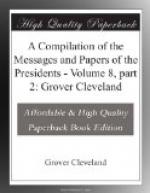SPECIAL MESSAGE.
WASHINGTON, September 17, 1814.
The PRESIDENT OF THE SENATE OF THE UNITED STATES.
SIR: The destruction of the Capitol by the enemy having made it necessary that other accommodations should be provided for the meeting of Congress, chambers for the Senate and for the House of Representatives, with other requisite apartments, have been fitted up, under the direction of the superintendent of the city, in the public building heretofore allotted for the post and other public offices.
With this information, be pleased, sir, to accept assurances of my great respect and consideration.
JAMES MADISON.
SIXTH ANNUAL MESSAGE.
WASHINGTON, September 20, 1814.
Fellow-Citizens of the Senate and of the House of Representatives:
Notwithstanding the early day which had been fixed for your session of the present year, I was induced to call you together still sooner, as well that any inadequacy in the existing provisions for the wants of the Treasury might be supplied as that no delay might happen in providing for the result of the negotiations on foot with Great Britain, whether it should require arrangements adapted to a return of peace or further and more effective provisions for prosecuting the war.
That result is not yet known. If, on the one hand, the repeal of the orders in council and the general pacification in Europe, which withdrew the occasion on which impressments from American vessels were practiced, suggest expectations that peace and amity may be reestablished, we are compelled, on the other hand, by the refusal of the British Government to accept the offered mediation of the Emperor of Russia, by the delays in giving effect to its own proposal of a direct negotiation, and, above all, by the principles and manner in which the war is now avowedly carried on to infer that a spirit of hostility is indulged more violent than ever against the rights and prosperity of this country.
This increased violence is best explained by the two important circumstances that the great contest in Europe for an equilibrium guaranteeing all its States against the ambition of any has been closed without any check on the overbearing power of Great Britain on the ocean, and it has left in her hands disposable armaments, with which, forgetting the difficulties of a remote war with a free people, and yielding to the intoxication of success, with the example of a great victim to it before her eyes, she cherishes hopes of still further aggrandizing a power already formidable in its abuses to the tranquillity of the civilized and commercial world.
But whatever may have inspired the enemy with these more violent purposes, the public councils of a nation more able to maintain than it was to acquire its independence, and with a devotion to it rendered more ardent by the experience of its blessings, can never deliberate but on the means most effectual for defeating the extravagant views or unwarrantable passions with which alone the war can now be pursued against us.




